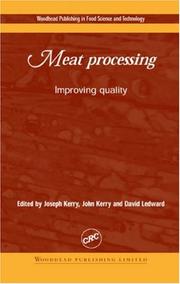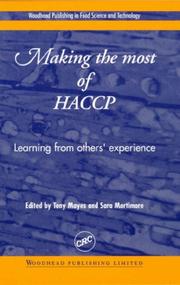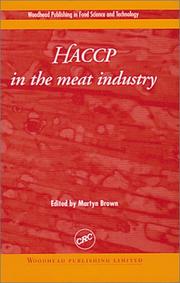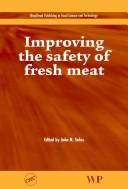| Listing 1 - 7 of 7 |
Sort by
|
Multi
ISBN: 9780128105016 0128105011 0128111887 0128105003 9780128105009 9780128105009 9780128111888 Year: 2017 Publisher: London ;San Diego, CA Academic Press
Abstract | Keywords | Export | Availability | Bookmark
 Loading...
Loading...Choose an application
- Reference Manager
- EndNote
- RefWorks (Direct export to RefWorks)
Hazard Analysis and Risk Based Preventive Controls: Building a (Better) Food Safety Plan is directed to those food safety professionals charged with ensuring or assisting with FSMA's preventative controls (PC) implementation and compliance in their routine job duties. The target audience includes those currently involved in the development, management, and execution of HACCP and/or other advanced food safety management systems, as well as those interested in advancing their knowledge base to gain a more thorough comprehension of HARPC requirements. FSMA topics covered include: identifying the food safety team and PCQI; creating the HARPC implementation strategy; starting the food safety plan; conducting a thorough hazard analysis; identifying adequate preventive control measures; determining appropriate PC management components; recognizing applicable verification and validation activities; supply chain management program; recall plans. Other operational topics include: document control systems; internal audit programs; third party audit management; regulatory visit preparation; and maintaining compliance. Provides a step-by-step guide to achieving FSMA compliance for food safety professionals who develop and manage food safety management systemsWritten by industry experts with direct experience in the formulation of the HARPC regulationsPresents insights into the underlying approach of FSMA's preventative controlsTransitions readers from HACCP to HARPC using GAP assessment to adapt existing food safety programs to the FSMA preventative controls requirements.

ISBN: 1591243467 9781591243465 1855734427 9781855734425 1855736535 9781855736535 1280372192 9781280372193 1855736667 9781855736665 1855735830 9781855735835 1855736683 9781855736689 1855735857 9781855735859 1591244625 0849315379 9786610372683 1280372680 9780849315374 0849315387 9780849315381 Year: 2002 Publisher: Cambridge, England ; Boca Raton, Florida : Woodhead Publishing Limited : CRC Press,
Abstract | Keywords | Export | Availability | Bookmark
 Loading...
Loading...Choose an application
- Reference Manager
- EndNote
- RefWorks (Direct export to RefWorks)
Microbiological risk assessment (MRA) is one of the most important recent developments in food safety management. Adopted by Codex Alimentarius and many other international bodies, it provides a structured way of identifying and assessing microbiological risks in food. Edited by two leading authorities, and with contributions by international experts in the field, Microbiological risk assessment provides a detailed coverage of the key steps in MRA and how it can be used to improve food safety.The book begins by placing MRA within the broader context of the evolution of international fo
Engineering --- Food Science and Technology --- Food --- Food industry and trade --- Hazard Analysis and Critical Control Point (Food safety system) --- HACCP (Food safety system) --- Sanitary microbiology --- Microbiology. --- Quality control. --- Safety measures --- Quality control --- Bacteriology
Book
ISBN: 0128194707 0128231548 9780128231548 9780128194706 Year: 2023 Publisher: London, United Kingdom San Diego, CA, United States Cambridge, MA, United States Kidlington, Oxford, United Kingdom
Abstract | Keywords | Export | Availability | Bookmark
 Loading...
Loading...Choose an application
- Reference Manager
- EndNote
- RefWorks (Direct export to RefWorks)
Present Knowledge in Food Safety: A Risk-Based Approach Through the Food Chain presents approaches for exposure-led risk assessment and the management of changes in the chemical, pathogenic microbiological and physical (radioactivity) contamination of 'food' at all key stages of production, from farm to consumption. This single volume resource introduces scientific advances at all stages of the production to improve reliability, predictability and relevance of food safety assessments for the protection of public health.

ISBN: 1855735040 1591243408 9781591243403 9781855735040 1855736519 9781855736511 0849312183 9780849312182 Year: 2001 Publisher: Boca Raton, Fla. Cambridge, England CRC Press Woodhead Pub.
Abstract | Keywords | Export | Availability | Bookmark
 Loading...
Loading...Choose an application
- Reference Manager
- EndNote
- RefWorks (Direct export to RefWorks)
The Hazard Analysis and Critical Control Point (HACCP) system has now become generally accepted as the key safety management system for the food industry worldwide. Whilst there are numerous publications on its principles and methods of implementation, there are relatively few on the experience of those who have actually implemented HACCP systems in practice and what can be learnt from that experience. Edited by two leading authorities on the subject, and with an international team of contributors, Making the most of HACCP describes that experience and what it can teach about implementing and
Planning (firm) --- Firms and enterprises --- Hazard Analysis and Critical Control Point (Food safety system) --- Food --- Food handling --- Health & Biological Sciences --- Diet & Clinical Nutrition --- Food sanitation --- Handling of food --- Sanitation, Household --- Foods --- Dinners and dining --- Home economics --- Table --- Cooking --- Diet --- Dietaries --- Gastronomy --- Nutrition --- HACCP (Food safety system) --- Food industry and trade --- Safety measures --- Quality control --- Food handling. --- Hazard Analysis and Critical Control Point (Food safety system). --- Safety measures. --- Engineering --- Food Science and Technology --- Primitive societies --- FOOD INDUSTRY --- QUALITY CONTROL --- SAFETY MANAGEMENT --- FOOD INSPECTION --- METHODS

ISBN: 0849308496 1855734486 9786610372201 1591240727 1280372206 1855736446 9781591240723 9781855736443 9781855734487 9781280372209 9780849308499 1855733951 9781855733954 Year: 2000 Publisher: Boca Raton, Fla. Cambridge, England CRC Press Woodhead Pub.
Abstract | Keywords | Export | Availability | Bookmark
 Loading...
Loading...Choose an application
- Reference Manager
- EndNote
- RefWorks (Direct export to RefWorks)
HACCP is a systematic approach to the identification, evaluation, and control of food safety hazards. It is being applied across the world, with countries such as the US, Australia, New Zealand, and the UK leading the way. However, effective implementation in the meat industry remains difficult and controversial. HACCP in the meat industry provides a survey of principles and practices, providing a guide to making HACCP systems work in the meat industry.
Food contamination --- Food contamination. --- Food --- Hazard Analysis and Critical Control Point (Food safety system) --- Meat industry and trade --- Meat industry and trade. --- Microbiology. --- Hazard Analysis and Critical Control Point (Food safety system). --- Engineering --- Food Science and Technology --- 637.5 --- Vlees --- Vleesbewaring --- Vleeskwaliteit --- 637.5 Meat. Flesh products for food --- Meat. Flesh products for food --- Agrotechnology and Food Sciences. Food Sciences --- Food Sciences (General). --- Food adulteration and inspection. --- Contaminated food --- Foods, Contaminated --- Contamination (Technology) --- Food adulteration and inspection --- Analysis of food --- Food, Pure --- Food inspection --- Inspection of food --- Pure food --- Adulterations --- Consumer protection --- Public health --- Sanitary chemistry --- Contamination --- Adulteration --- Inspection --- FOOD INSPECTION --- FOOD CONTAMINATION --- MEAT --- STANDARDS --- LEGISLATION AND JURISPRUDENCE --- PREVENTION AND CONTROL

ISBN: 9781855739550 1855739550 9786610361779 1280361778 1845691024 9781845691028 9781280361777 9780849334276 0849334276 Year: 2005 Publisher: Boca Raton Cambridge CRC Press Woodhead
Abstract | Keywords | Export | Availability | Bookmark
 Loading...
Loading...Choose an application
- Reference Manager
- EndNote
- RefWorks (Direct export to RefWorks)
It is widely recognised that food safety depends on effective intervention at all stages in the food chain, including the production of raw materials. This book provides an authoritative reference summarising the wealth of research on reducing microbial and other hazards in raw and fresh red meat.
Hazard Analysis and Critical Control Point (Food safety system). --- Meat. --- Meat industry and trade. --- Meat-- Microbiology. --- Industries --- Business & Economics --- Food contamination --- Meat --- Food handling --- Abattoir --- Environmental monitoring --- analysis --- prevention and control --- microbiology --- methods --- Meat industry and trade --- Meat inspection. --- Safety measures.
Book
ISBN: 1461450276 1489986405 1461450284 1299197248 Year: 2013 Publisher: New York : Springer,
Abstract | Keywords | Export | Availability | Bookmark
 Loading...
Loading...Choose an application
- Reference Manager
- EndNote
- RefWorks (Direct export to RefWorks)
HACCP: A Practical Approach, 3rd edition has been updated to include the current best practice and new developments in HACCP application since the last edition was published in 1998. This book is intended to be a compendium of up-to-date thinking and best practice approaches to the development, implementation, and maintenance of HACCP programs for food safety risk reduction. Introductory chapters set the scene and update the reader on HACCP developments over the last 15 years. The preliminary stages of HACCP, including preparation, planning and system design, are covered first, followed by a consideration of food safety hazards and their control. Prerequisite program coverage has been significantly expanded in this new edition, reflecting its development as a key support system for HACCP. The HACCP plan development, verification and maintenance chapters have also been substantially updated to reflect current practice and a new chapter on application within the food supply chain has been added. Appendices provide a new set of case studies of practical HACCP application plus two new case studies looking at lessons learned through food safety incident investigation. Pathogen profiles have also been updated by experts to provide an up-to-date summary of pathogen growth and survival characteristics that will be useful to HACCP teams. The book is written both for those who are developing HACCP systems for the first time and for those who need to update, refresh and strengthen their existing systems. New materials and new tools to assist the HACCP team have been provided and the book discusses the current situation on issues that are still undergoing international debate, such as operational prerequisite programs. Sara Mortimore is the Vice President of Product Safety, Quality Assurance, and Regulatory Affairs at Land O’Lakes, Inc., USA. Carol Wallace is Principal Lecturer, Food Safety Management and Co-Director of the International Institute of Nutritional Sciences and Applied Food Safety Studies at the University of Central Lancashire, UK.
Hazard Analysis and Critical Control Point (Food safety system). --- Health & Biological Sciences --- Biomedical Engineering --- Hazard Analysis and Critical Control Point (Food safety system) --- Food --- Microbiology. --- Safety measures. --- HACCP (Food safety system) --- Bacteriology --- Chemistry. --- Public health. --- Quality control. --- Reliability. --- Industrial safety. --- Food Science. --- Quality Control, Reliability, Safety and Risk. --- Public Health. --- Biotechnology. --- Sanitary microbiology --- Food industry and trade --- Safety measures --- Quality control --- Food science. --- System safety. --- Safety, System --- Safety of systems --- Systems safety --- Accidents --- Industrial safety --- Systems engineering --- Science --- Prevention --- Calidad y Seguridad en Productos Agroalimentarios (70743113) --- Bibliografía recomendada --- Food—Biotechnology. --- Community health --- Health services --- Hygiene, Public --- Hygiene, Social --- Public health services --- Public hygiene --- Social hygiene --- Health --- Human services --- Biosecurity --- Health literacy --- Medicine, Preventive --- National health services --- Sanitation --- Industrial accidents --- Industries --- Job safety --- Occupational hazards, Prevention of --- Occupational health and safety --- Occupational safety and health --- Prevention of industrial accidents --- Prevention of occupational hazards --- Safety, Industrial --- Safety engineering --- Safety of workers --- System safety --- Dependability --- Trustworthiness --- Conduct of life --- Factory management --- Industrial engineering --- Reliability (Engineering) --- Sampling (Statistics) --- Standardization --- Quality assurance --- Quality of products
| Listing 1 - 7 of 7 |
Sort by
|

 Search
Search Feedback
Feedback About UniCat
About UniCat  Help
Help News
News